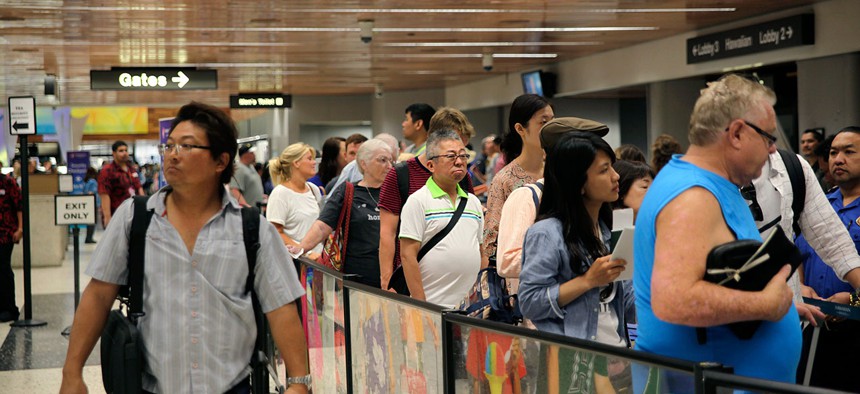Should Airports Privatize Security to Avoid Long Lines?
Some U.S. cities are looking into hiring private contractors and moving away from the TSA after a month of historically long lines.
More than a minute into his journey from the front of the security line at Chicago’s Midway Airport to its end, one man filming the weaving monstrosity recently lamented, “Guess what? It’s just getting started.” Walking past endless rows of fellow travelers, he doesn’t find his place at the end of the line for a few hundred more feet. Only then does his hours-long trip through security begin.
People across the United States have faced similar travel nightmares this month, thanks to historically long security lines at airports. Officials are telling passengers to arrive three hours before their flights in order to give them enough time to get through long lines manned by the Transportation Security Administration. Between June and August, the high season for air travel, 231 million people are expected to fly in the U.S. and likely exacerbate those waiting times.
The long lines have officials in some U.S. cities wondering whether they should ditch the TSA and turn to the private sector to provide security. Authorities in Atlanta and New York sent letters this week to the TSA to start the process of privatizing airport security, and a group of Chicago aldermen are calling on Mayor Rahm Emanuel to follow suit. Charlotte and Phoenix officials have also expressed some interest.
Some lawmakers say contractors can react more quickly to fixing issues like long lines. Darrell Issa, a Republican congressman from California, wrote Thursday in a column for CNN that privatizing airport security could solve “our broken airport security system.”
“The TSA, of course, could still exist to set standards and oversee quality control for the companies administering security, but we could do away with the long lines and endless sea of ‘suitcase surgeons’ in their iconic blue rubber gloves,” Issa wrote.
Before 9/11, it was up to airlines to hire private contractors for terminal security. After the attacks, the federal government created the TSA to streamline the security process and took over most airport security nationwide. Airports had the option to use private contractors, but only through the approval and with the funding of the TSA. Many airports took the TSA up on its offer.
In the years since, the TSA has faced criticism for what some describe as aggressive pat downs and oversights that have allowed banned items to make it through security. A 2015 investigation by the Department of Homeland Security Inspector General showed that TSA agents missed 95 percent of mock explosives and banned weapons that undercover investigators brought through security. One TSA agent even missed a fake explosive device taped to the back of one of the undercover investigators.
Already, 22 airports across the country use private contractors instead of the TSA for airport security, including in Kansas City and San Francisco, which kept its private security even after the 9/11 terrorist attacks. That seems to have worked well for those airports, as the Chicago Tribune reports:
Reviews by consultants and government agencies have found that private screeners perform at the same level or modestly better than TSA-staffed operations, with higher marks for customer service and flexibility.
A 2011 report from Republican members of the House Committee on Transportation and Infrastructure showed private airport security officers in San Francisco processed 65 percent more passengers per screener than their TSA counterparts in Los Angeles.
The TSA says it is understaffed because of budget cuts and a higher volume of travelers. The union that represents security officers says the TSA needs to add at least 6,000 more officers to the TSA’s 42,000-member workforce to meet airports’ demand. But to hire new officers would mean an injection of tens of millions of dollars in a budget of $7.4 billion—an unlikely sell for a fiscally conservative Congress.
As complaints grow against the TSA, the administration is attempting to do what it can with the resources it has. Officials say they will hire an additional 800 security officers nationwide by the end of the month to ease some of the demand. On Monday, top officials also replaced the administration’s head of security.
When city officials put in requests to switch to private security, the TSA has 120 days to review the applications and decide whether to approve them. Any applications submitted now would not have any effect on this year’s busy summer months.
For now, some members of Congress have suggested Americans up for TSA Pre-Check for expedited security screenings. Ironically, the TSA warns that “consumers may experience longer than usual wait times at some enrollment centers” because of high demand, forcing travelers to wait in long lines to avoid long lines.



